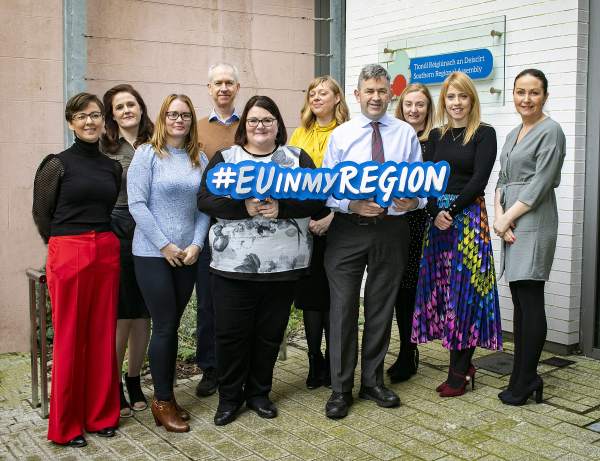This Europe Day, the Southern Regional Assembly is celebrating the real impact of Ireland’s EU membership in our regions and communities through supports from the European Regional Development Fund (ERDF), from small business supports through the Local Enterprise Offices, to sustainable regeneration of our urban areas by the local authorities, and research activities.
Every 9th May Europe Day celebrates the signing of the Schuman Declaration on 9 May 1950 – an ambitious plan to secure long-term peace in post-war Europe that is considered the beginning the European Union we know today.
Working for peace in Europe is even more important as we highlight our unity and solidarity with Ukraine.
EU supports have had an enormous impact on our local communities and regions, co-funding innovative projects, supporting small and medium-sized enterprises and promoting a low-carbon economy.
The EU spends approximately one fifth of its total budget on regional development projects through the ERDF and a broad spectrum of initiatives across the south and east of Ireland have reaped the benefits, including infrastructure projects linked to research and innovation, telecommunications, the environment, energy and transport projects.
The ERDF also co-finances direct aid to investments in companies, particularly SMEs, to create sustainable jobs; projects that support regional and local development and foster cooperation between towns and regions; and technical assistance measures.
Examples of socially inclusive and sustainable regional projects capitalising on ERDF funding include:
- Enhancement of Clare’s Shannon Town Park
- Regeneration of Limerick’s O’Connell Street
- Transformation of Waterford city’s historic Apple Market
- Landscaped public realm works at Kilkenny’s new Abbey Quarter
- Transformation of Tralee’s Island of Geese
- Regeneration works at Wexford’s Crescent Quay
- Construction of Cork’s youngest bridge, Mary Elmes
- Construction of a boardwalk along the side of Mallow Bridge
The Assembly has a remit for regional and spatial planning, including the Regional Spatial & Economic Strategy for the Southern Region, and the management and delivery of ERDF programmes, such as the S&E Regional Programme and Interreg Programmes.
Last year, the Assembly audited EU funding claims worth over €7 million to Irish organisations that are participating in Interreg projects which support new and next-stage research, small business supports, and bring expertise and knowledge from other EU regions to inform our public policy development.
The Southern Region is represented by 33 local councillors who serve as Assembly Members and meet monthly to discuss issues related to regional planning, local, national and EU policies, EU programme management and EU project benefits.

